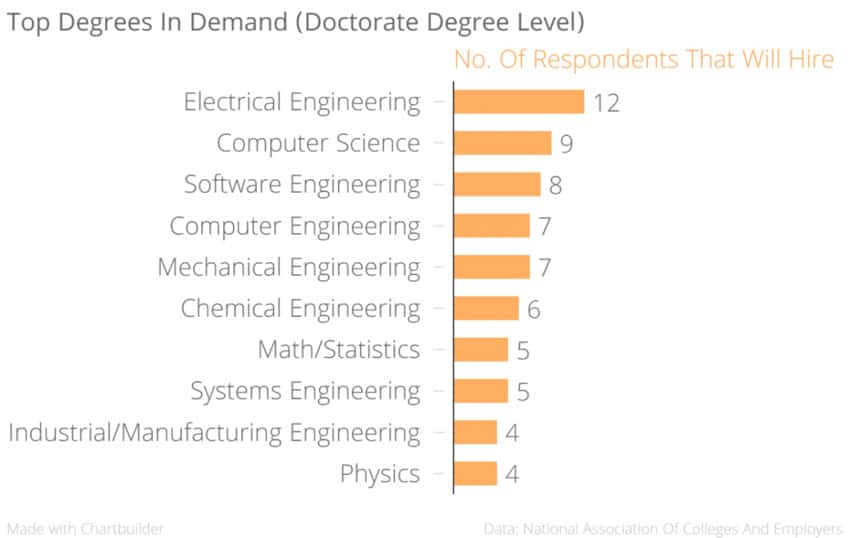
Introduction
From working with computer hardware to GPS devices, Electrical Engineers develop pieces of equipment to be used in the commercial, medical, communications, aircraft industries. They are also responsible for the testing and supervising of their manufacturing. Electrical Engineering is one of the highest-paid engineering disciplines. Let us take a closer look at the same.
The salary of an Electric Engineer varies from one state to another in the United States. The average annual salary of an Electric Engineer lies between USD 60,000 – USD 143,000. The top ten percent of Electrical Engineers earn more than USD 167,000 annually, whereas the bottom ten percent earn USD 60,000 – 65,000 per annum.
How to Become an Electrical Engineer
From electric grids to working on electric gadgets, Electric engineers have a plethora of job and work opportunities. Moreover, to become an Electrical Engineer, a candidate requires strong commitment, willingness to learn everything about electricity, electric pieces of equipment, and modicum training. Listed below are the steps to become an Electrical Engineer in the United States:
- Step 1: Start Early
By starting early we mean, start opting for subjects like Physics, maths, especially calculus, trigonometry, algebra, or drafting. All these subjects are necessary if a candidate has a genuine interest in becoming an Electrical Engineer. Also, drafting is beneficial as Electric Engineers also require them to make technical drawings.
- Step 2: A Degree in Electrical Engineering
Most top companies or employers require a candidate to have a Bachelor’s degree accredited by ABET ( Accreditation Board for Engineering and Technology ) in Electrical Engineering. A candidate can land an entry-level job with a Bachelor’s degree, among other requirements. The course work of a Bachelor’s degree is extensive with an amalgamation of lab work and theory subjects ranging from network theory to electrical machines and more.
Candidates can upskill their educational qualifications by acquiring a Master’s degree in Electrical Engineering or even a doctoral and then land a job later. A Master’s degree in Electrical Engineering is a five-year program. Following the Master’s degree, a candidate can land a job as an instructor or join an R&D position at a private firm.
Different Degree Levels of an Electric Engineer
- A Bachelor’s Degree in Electrical Engineering
Usually Electrical or Electronics Engineers are into the same kind of work. To work as an Electrical Engineer, a candidate mandatorily needs a Bachelor’s degree in Electrical and Electronics Engineering, Electronics Engineering, Electrical Engineering, or any other equivalent degree. It is the basic educational qualification that is needed to land a job as an Electrical Engineer or an Electronics Engineer.
The degree program can be 4 to 5 years long, depending on the engineering school and if any specific subjects are chosen. The program consists of classroom learning, lab work, and fieldwork. The fieldwork or practical experience in this engineering field is offered only by some schools or universities as cooperative programs. These cooperative programs offer practical experience to students, while their ongoing course. Students can also voluntarily apply for internships during the course work to gain experience.
Candidates can also pursue an integrated Bachelor’s and Master’s degree.
- A Master’s Degree in Electrical Engineering
A Master’s degree is a 2-year program after a Bachelor’s degree and is rather more challenging. A graduate degree has somewhat the same subjects as that of a Bachelor’s degree. It does necessitate studying all the subjects but selecting a specialization or any subject of their interest. Some of the courses an undergraduate in Electrical Engineering can take up is:
- Power Systems,
- Semiconductors,
- Control Systems,
- Electro-Optics
- A Doctoral or Ph.D. in Electrical Engineering
Candidates who complete their Master’s Degree can further get into research work and pursue a doctoral or a Ph.D. in Electrical Engineering. It gives a chance for the candidates to reach the top levels of the industry and also better employment opportunities.

- Step 3: Necessary Examinations for Employment
Once a candidate has completed their undergraduate degree, they can further take the Fundamentals Engineering or FE Exam. After getting a passing score in the FE exam, the candidates can work as interns or trainees in the industry. These interns or trainees are also referred to as the engineers-in-training (EIT) and engineer interns (EI) respectively.
After qualifying for the FE exam and gaining at least four-year working exPErience candidates, can take the Professional Engineer or PE exam.
An Entry-Level Job after the FE Exam
Employers prefer candidates to have a Bachelor’s degree as it is the stepping stone to working in the industry. Knowledge in the field makes things easier for the candidates working as interns or trainees and advances their careers quickly.
- Step 4: Additional Skills to Become an Electrical Engineer
- Focus and Initiation: Electrical Engineers are responsible for designing complex electrical systems, electrical equipment, hence a vast knowledge of the subject is required. To grasp the concepts of electrical engineering candidates, one needs to have a focused mind. They also need to keep updating their knowledge by continuously studying and revising the concepts learned earlier. It keeps the electrical engineers afloat with the current trends in the industry. Electrical Engineers should apply their knowledge by taking up projects that will further enhance their knowledge and skills.
- Mathematics: Having a strong background in Mathematics is a must for an electrical engineer. Having a stronghold in calculus, differential equations, and advanced maths is necessary.
- Soft Skills: It may look like that a candidate working as an Electrical Engineer does not necessarily require soft skills. But Electrical Engineers will have to work with other engineers or technicians hence they must have good communication and interpersonal skills.
- Technical Writing Skills: Electrical Engineers do require technical writing skills to pen down technical details of the equipment they are working on. The documents can be anything from project proposals to operation manuals.
- Step 5: Tools and Technologies for an Electric Engineer
Electrical Engineers should know signal generators, tube furnaces, spectrometers, and more. Along with these they also need to know software programs like AutoCAD (Computer-aided design), MATLAB, PLC (programmable logic Controller) code generator software, Eclipse IDE, and anyone the object-oriented programming language like Java, C++.
What does an Electrical Engineer do?
Electrical engineers work on various pieces of equipment, from small minute gadgets to electrical systems of the aircraft. For an electrical engineer, it is necessary to know the concept of physics, electromagnetism, and everything there is to know about electricity. Not only are the electrical engineers responsible for the design of new pieces of equipment but also to enhance the existing ones. It would suffice to say that Electrical engineers are required in every industry be it technology, communications, or transportation.
Additionally, Electrical engineers are also responsible for handling practicalities like conducting feasibility studies or cost analysis. Due to their multiple roles, electrical engineers can work as managers, consultants, or research and development. Electrical engineering is a vast subject, hence there are numerous specializations to it. Common sub-disciplines are listed below. An Electrical Engineer can work on any one of them.
- Power Systems
- Control Systems
- Signal and Systems
- Computers
- Electronics and Instrumentation
Even though Electrical Engineering has numerous sub-disciplines, it all depends on the background and expertise as to where an Electrical Engineer might work. Also, an electrical engineer needs to keep themselves updated with the latest industry trends by being in constant touch with the academics. Most initial jobs of Electrical Engineers are after completing their undergraduate. A Bachelor’s degree from an ABET-accredited college is more than enough. Moreover, with extra certifications, they can further climb up the career ladder.
Listed below are a few roles and responsibilities of an Electrical Engineer.
Roles and Responsibilities of an Electric Engineer
- Designing or developing new products or enhancing the quality of the existing ones.
- Participate in or direct the testing of the equipment so that it works as per the industry standards and meets the specifications.
- Electrical Engineers can also work as project managers to ensure that the projects are completed on time and are within the budget.
- Look into consumer complaints and work on their resolutions.
- Develop an electrical system plan, develop maintenance and testing procedures for pieces of equipment.
- Recommend design modifications in the equipment for efficient working of the system.
- Risk assessment of equipment and ensure the safety standards of the electronic pieces of equipment are met.
- Plan, design, and develop electronic components, products, or systems for industrial, commercial, medical even military applications.
Job levels of an Electrical Engineer
Below is the hierarchy of Electrical Engineer job levels:
- Associate Engineer – An associate Engineer is an entry-level engineer that has zero to two years of work experience.
- Senior Engineer – A Senior Engineer has experience between four two ten years. A candidate gains the job title of a senior engineer after passing the PE exam.
- Principal Engineer – With an experience of more than 15 years, a principal engineer is primarily an expert in the respective field
- Engineering Manager (10+ years) – Electrical Engineers holding managerial positions are called Engineering managers. They have an overall experience of more than ten years and might work as a Principal Engineer or Project Managers.

Salary of an Electrical Engineer
Electrical Engineering might be one of the toughest engineering disciplines but also is very much in demand. Electrical Engineers are paid well. According to the Bureau of Labor, reports suggest that the average salary of an Electrical Engineer is between USD 143,000 to USD 167,000. It can also be as low as USD 70,000.
An Electrical Engineer must be at the top of their career ladder to earn more, as the top ten percent of Electrical Engineers are paid close to USD 167,000. However, the bottom ten percent are paid less than USD 69000. The salaries vary as per the employer and the state in which one is working as an Electrical Engineer. It is known from the previously collected data that the highest-paid Electrical Engineers are in California, Alaska.
The median annual wage for electrical engineers was $100,000 in May 2020. Whereas, the median salary of an electronics Engineer was USD 107,000. The median salary is nothing but the average of the lowest salary amount and the highest. The data below depicts last years’ average or median salary of an Electrical Engineer and their respective industry.
- R&D-USD 115,000
- Equipment Manufacturing-USD 106,000
- Power Generation, transmission, and distribution- USD 101,000
Most Electrical Engineers are employed full time, but they can also work part-time but are substantially less than full-time engineers.
Salary of an Electric Engineer By State
The picture below depicts the Salary of an Electrical Engineer as per different States in the United States:

Salary of an Electric Engineer: Top Companies
There is no shortage of job opportunities for Electrical Engineers. Some of the top recruiters that hire Electrical Engineers are.
- Apple
- Schnider
- General Electrical
- Texas Instruments
- Milwaukee Tool
- Intel
- Boeing
- Tesla
- Shell Oil Company
Hiring Outlook
The work of an Electrical Engineer and Electronics Engineer is similar. As much as electrical engineers are in demand, so are electronics engineers. The number of candidates opting for an engineering course in Electrical is also increasing. Electrical Engineers must keep themselves updated on recent industry trends to stand out from others. By 2022, Electrical Engineers jobs might be expected to grow at a slow pace. Traditional manufacturing is replaced with computer system design, hence Electrical Engineers are shifting towards building pieces of equipment using advanced technologies using a computer, GPS, and so on.
Conclusion
Electrical Engineers can work in job profiles from managerial to supervisory. They can lead a team of engineers or technicians or work as project managers. Electrical Engineers can also work in a sales profile wherein they are required to discuss the technical aspects of a product and its operation. Electrical Engineers or Electronics Engineers earn the same. Top earners take a salary of USD 167,000, and the same is that of an Electronics Engineer. There is a myriad of factors that affect the salary trends of an Electrical Engineer. Respective employer, state, job profile all account in deciding the salary of an Electrical Engineer.
Frequently Asked Questions
- Can internships help in gaining experience as an Electric Engineer?
Yes, internships offer the same practical experience to candidates as cooperative programs in colleges. Thus they are very beneficial and must be opted for by college students. - What are the career opportunities for an Electrical Engineer after an undergraduate degree?
A candidate with an undergraduate degree in electrical engineering can work as a trainee or a trainee initially. After clearing the professional engineering exam, the candidate is then recognized as a professional engineer. An undergraduate degree is more than enough for a candidate to land an entry-level job. - What is the difference between FE and PE exams?
Both the exams are mandatory for a candidate to start working as an Engineer. The FE exam allows a candidate to work as a trainee or an intern, whereas the PE exam allows a candidate to work as a full-time engineer. It is also necessary for a candidate to have at least four years of work experience before giving the PE exam. - How can Electrical Engineers Advance on the Career Ladder?
Electrical Engineers can advance the career ladder if they have the necessary skills. These include technical as well as soft skills. It also cannot be stressed enough that a candidate should mandatorily know the latest market trends and keep themselves up to date with their degree courses. - Can a FE or PE US certified Electrical Engineer work in another country?
A candidate can work in another state within the USA. Working in another country might require additional requirements which are to be checked while applying for a job in another country or outside the USA.